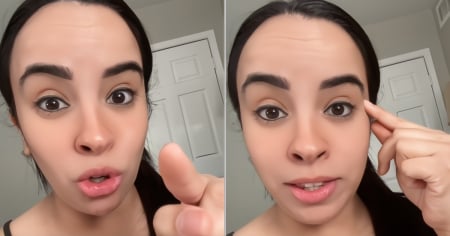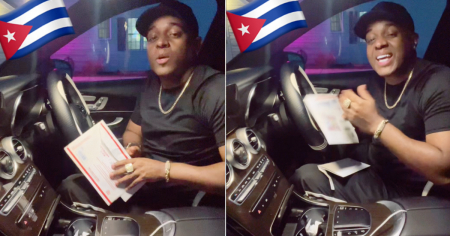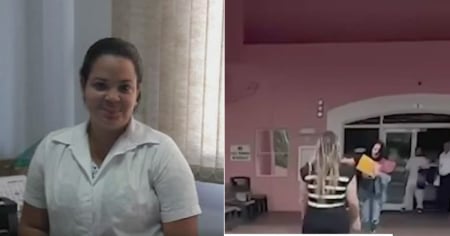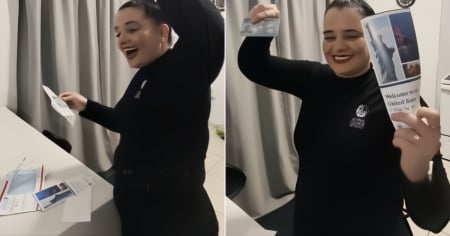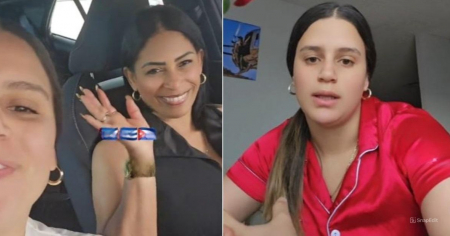A Cuban migrant identified as Robert Denis has shared an emotional message on TikTok from Las Vegas, where he states he is willing to give up returning to Cuba in order to achieve his legalization in the United States. “I am I-220A,” he declares confidently, in a video accompanied by the song Very Sad by Enchan and hashtags like #cubans, #I220A, #miami, and #sad.
Brothers, I am I-220A and I clearly love my family; I miss them and I have cried many times thinking about them, but if to get my residency and to be legal in this country I have to renounce everything, then I would do it; I am capable of doing it,” stated @robertdenissinger. “I am capable of not going back to Cuba so that I can obtain my residency because I know that if I bring them here, they will be better off. But if I go back there, it will be much worse,” he continued, before adding: “Remember that God's timing is perfect.”
The young man also wanted to offer hope to those facing the same migratory uncertainty: “There are many people fighting for this. Don't think you're alone, brother. Every day, more people are out there on social media, in every corner of this country, fighting for their I-220A applications, and although many wish we'd never achieve legal status to continue profiting from our cases... remember that God's timing is perfect. God bless you.”
The post has sparked a wave of reactions on TikTok, where other Cubans with the same immigration status have shown their support. "I will make the necessary sacrifices because with my residency, I could bring them over for a visit or to live here legally without going through what I had to endure," wrote one user. Other messages expressed a similar determination: "That's how smart people talk; you can bring the family later or take them to another country; it's not worth going back just to lose."
There were also encouraging comments such as "Thank you for your words," "One day we will have it," "Very true, brother," "Blessings," and "We will legalize soon," which reflect a resilient, hopeful community deeply connected by their shared migration experience.
Robert Denis had already shared similar thoughts in previous videos. In one of them, he addressed those in the same situation: “Stop listening to your cousin, your friend who said she heard, because I haven’t seen anyone who has actually been deported with an I-220A. Do your taxes, do everything properly, drive safely... no one is going to take us out of this country. Long live the I-220A!”
Denis' experience adds to that of many other Cuban migrants who have documented their lives under the I-220A immigration status, encompassing moments of hope, anxiety, and uncertainty. Some cases have had encouraging outcomes, such as that of a young man who, after weeks of waiting, received his work permit, which generated excitement on social media about the possibility that "the next step might be residency."
Another positive example was Mely, a young Cuban I-220A who won her asylum case and celebrated it with her mother in an emotional video. “I am so happy, my mom already cried, I cried too,” Mely said, while urging others not to be overwhelmed by rumors and alarming news.
There have also been cases like that of the Cuban doctor Elisbet Cardero who was arrested after attending an immigration appointment, due to an administrative error for not reporting a change of address, but she was ultimately released on a $20,000 bond after it was shown that she posed no threat to the United States.
Beatriz Monteagudo, a young Cuban detained in California, for her part, reported at the end of March from the detention center the uncertainty that many women with I-220A experience, who claim they have not committed any crimes and are simply seeking to start a new life in freedom.
One of the cases that garnered significant public attention was that of Laura de la Caridad González, who was detained in Florida and later released thanks to the intervention of Congresswoman María Elvira Salazar, who has specifically requested that Cubans with an I-220A and no criminal record not be detained.
The migration landscape has become more uncertain since the reinstatement of stricter immigration policies under the new administration of Donald Trump. Attorney Willy Allen has warned that the recent freezing of residency applications and revocation of humanitarian parole leaves thousands of Cubans in legal limbo.
Additionally, cases of deportations without prior offenses have been documented, raising alarm among those still waiting for an appointment in immigration court or the possibility of seeking relief under the Cuban Adjustment Act.
In this scenario, Robert Denis's message resonates as a call for unity and faith among those who continue to fight for legalization: “Remember that God's timing is perfect. God bless you.” His testimony, like that of many others, represents the voice of a community determined not to give up.
Frequently Asked Questions about the I-220A Immigration Status for Cubans in the United States
What is the I-220A and why is it important for Cubans in the U.S.?
The I-220A is a document that grants parole to migrants, allowing them to stay in the United States while their immigration status is being determined. However, it does not guarantee permanent residency or protection against deportation, which leaves many Cubans in a state of legal uncertainty.
Why do some Cubans with I-220A avoid returning to Cuba?
Many Cubans with I-220A, like Robert Denis, prefer not to return to Cuba because they fear losing the opportunity to legalize their status in the U.S. and improve their situation and that of their families. Furthermore, they feel that once outside of Cuba, they have better opportunities to provide a more secure and stable future for their loved ones.
How does the I-220A immigration situation affect Cuban families?
The I-220A status can be devastating for Cuban families, as it causes long separations and emotional sacrifices. Many migrants leave their children and relatives behind, hoping to reunite in a more stable future, facing the pain of distance and the uncertainty of the migration process.
What challenges do Cubans with I-220A face in the U.S.?
Cubans with I-220A face multiple challenges, including legal uncertainty, lack of access to permanent residency, and the constant fear of deportation. Additionally, they must adapt to the economic and cultural differences of a developed country, which can be a long and complicated process.
What impact could the U.S. presidential elections have on the future of Cubans with I-220A?
The U.S. presidential elections could significantly influence immigration policies, impacting Cubans with I-220A. A change in administration could open new opportunities or, conversely, tighten policies towards migrants, increasing uncertainty about their future in the country.
Filed under:

